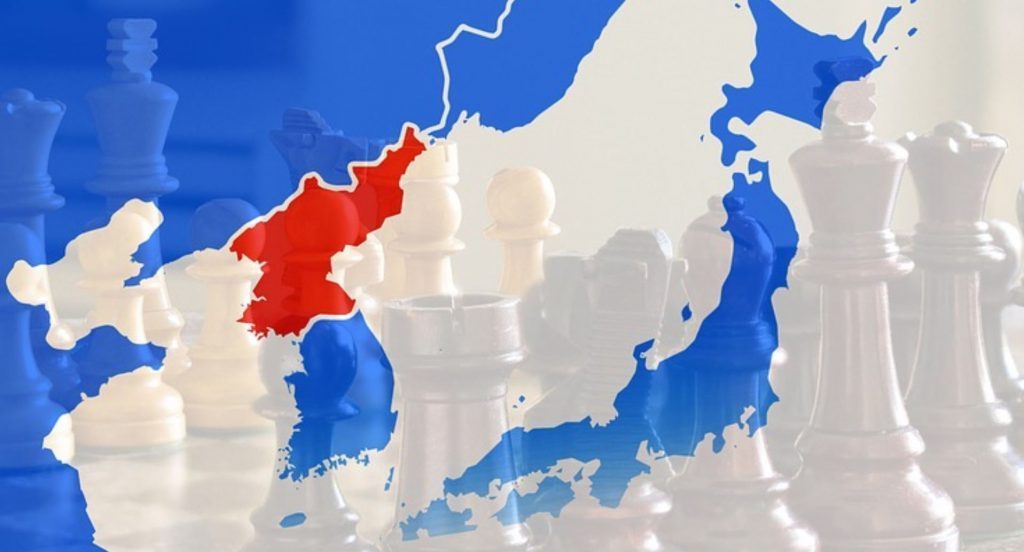Feckless boasts of military might and icy vows to annihilate one another might not necessarily prove war between the U.S., North Korea, and their allies is nigh, but the monumental increase in stocks of weapons and defense manufacturers — the economic fingerprints a preparation for a colossal military endeavor — just might.
“North Korea best not make any more threats to the United States,” President Trump railed yesterday. “They will be met with fire and fury like the world has never seen.”
If, as legendary author John Steinbeck posited, “all war is a symptom of man’s failure as a thinking animal,” than the altogether avoidable rush for violent, physical confrontation with North Korea — currently unfolding by the hour — could easily be deemed foolishness of the highest order.
After all, when nations resort to verbal sparring over the size and force of one another’s … militaries, it’s difficult not to picture world leaders as children hurling insults in a sandbox — a disturbing mental image only worsened by the fact Trump and perhaps Kim hold keys to arsenals with nuclear capabilities never before seen on Earth.
Horrifying recollections of bombs dropped on Hiroshima and Nagasaki by the United States in World War II precisely 72 years ago — the latter, to the day — paint a cold if prescient portent of the need for defense.
Keen to shore up defenses amid the latest iterations of political tumult between the cloistered totalitarian regime and the supposed Land of the Free, a number of Lockheed Martin’s customer nations are snatching up missile defense systems in preparation for what some analysts contend may be the next world war.
After many years of failure,countries are coming together to finally address the dangers posed by North Korea. We must be tough & decisive!
— Donald J. Trump (@realDonaldTrump) August 8, 2017
Fear has infected the planet — so the fraught business of national defense is booming.
“The level of dialogue around missile defense is now at the prime minister and minister of defense level,” vice president of Lockheed’s Air and Missile Defense business, Tom Cahill, noted in an interview with Reuters, which added,
Some countries are putting missile defense at the top of their list of desired capabilities, Cahill said. Interest has increased over the last 12 to 18 months, as have threats, he said.
Shares of Lockheed are up nearly 8 percent, to $300.10, since North Korea’s first long-range missile test on July 4. The stock is up 20 percent year-to-date.
Of course, that was yesterday. Today, Lockheed Martin stocks continue to rise — just prior to publication, stocks hovered around $305 per share — and show no indications of falling to levels typical of a less charged global atmosphere.

U.S. government business comprised 70 percent of Lockheed Martin’s total revenue last year; international clientele, 27 percent — a figure the company seeks to grow.
Indeed, while North Korean President Kim Jong-un certainly tends toward the hyperbolic, Pyongyang’s repeated missile tests have frayed the nerves of neighbors — particularly those of U.S. allies, South Korea and Japan.
Recent long-range missile tests from obdurately belligerent North Korea shocked the United Nations Security Council into a unanimous vote to impose severe sanctions — an action putatively slated to evaporate a breathtaking $1 billion annually in losses on the nation’s most lucrative exports.
Critics of Trump’s needless provocation of the Korean regime and Washington’s apparent insistence the public believe Pyongyang somehow acquired a veritable stockpile of nuclear warheads conjure the specter of President George W. Bush’s storied, nonexistent Weapons of Mass Destruction — and the resulting entanglement the U.S. still fights there, despite the claim having been proven false.
It was U.S. sanctions and missile defense system presence just inside the South Korean border which have groused Kim into a sharply bellicose tone, some say, and any threat from the North comes courtesy of Western provocation.
Given North Korea’s extreme isolationism, proving nukes sit ready to destroy the West — oddly, an admonition used by both parties — would be a Herculean task.
But not everyone in the Trump administration is willing to paint Pyongyang as formidable as it paints itself. Trump adviser Sebastian Gorka scoffed in an interview Tuesday morning with FOX Business, terming North Korea a “Lilliputian flea.”
“North Korea is a Stalinist regime,” Gorka noted, “but it can’t even feed its own people.”
No matter the facts, apparently, the military-industrial machine’s cogs won’t rest until international customers have their weapons of mass destruction — cementing a bright future for Lockheed Martin and its ilk, alone — particularly when the latest Number One Threat constitutes little more than a phantom menace.
Claire Bernish began writing as an independent, investigative journalist in 2015, with works published and republished around the world. Not one to hold back, Claire’s particular areas of interest include U.S. foreign policy, analysis of international affairs, and everything pertaining to transparency and thwarting censorship. To keep up with the latest uncensored news, follow her on Facebook or Twitter: @Subversive_Pen. This article first appeared at The Free Thought Project.
Image Credit: Pixabay
Source Article from http://feedproxy.google.com/~r/ActivistPost/~3/Z8PiZey7yLs/military-industrial-complex-highest-stock-prices-ever-north-korea-war.html
Related posts:
Views: 0
 RSS Feed
RSS Feed

















 August 10th, 2017
August 10th, 2017  Awake Goy
Awake Goy 
 Posted in
Posted in  Tags:
Tags: 
















